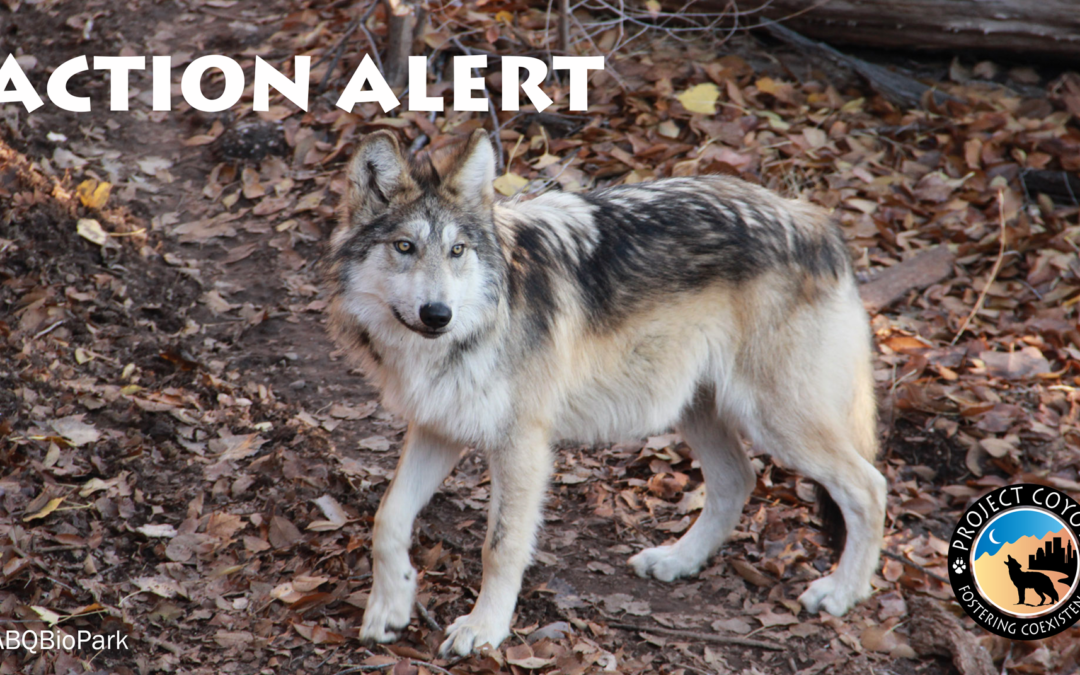Protect Mexican Gray Wolves!
Speak up before May 16 to comment on the Mexican Gray Wolf Recovery Plan
The U.S. Fish and Wildlife Service (USFWS) has just released their revised Recovery Plan for the Mexican gray wolf. Recovery plans are one of the most critical tools for species conservation under the Endangered Species Act. These plans serve as road maps to recovery and outline specific actions on how the USFWS plans to recover the species.
This revision comes in response to a court order in October 2021, where a federal district court judge ruled that the USFWS failed to address human-caused mortality affecting Mexican gray wolves’ recovery. Currently, 70% of Mexican wolf deaths are human-caused and illegal killing remains the biggest hindrance to recovery.
The USFWS is now accepting comments on how to address human-caused mortality in the population. Comment before May 16 to demand the USFWS properly address this critical threat to the survival of the Mexican gray wolf population.
Please comment TODAY and demand the USFWS improve lobo recovery!
Here’s how you can help:
- Comment on this plan. Go to the regulations page for Docket No. FWS-R2-ES-2022-0018, click the comment button in the upper left of the page, enter your comments, indicate if you’re submitting as an individual or representative of an organization and submit.
• Craft your comments in your own words using the Talking Points below.
• Hard copy comments can be submitted by U.S. mail or hand-delivered to:
Public Comments Processing
Attn: Docket No. FWS-R2-ES-2022-0018
U.S. Fish and Wildlife Service Headquarters
MS: PRB/3W; 5275 Leesburg Pike
Falls Church, VA 22041–3803 - Write a Letter to the Editor (LTE) and submit it to your local newspaper.
• Use the talking points below, and see tips on LTEs here.
- Spread the word by sharing this alert and encouraging others to take action.
* * * * *
Talking Points ~ Please personalize!
- USFWS should reinforce the strictest Endangered Species Act protections for Mexican gray wolves to decrease the potential of illegal killings.
- Policies that loosen Endangered Species Act protections for Mexican gray wolves lead to substantial increases in illegal poaching of the species.
- USFWS should not only increase enforcement of poaching by hiring more Conservation Law Enforcement Officers but increase prosecution of poaching incidents.
- Prosecution of poachers has been hindered by the Justice Department’s McKittrick policy which requires the government to prove the defendant knew the biological identity of the animal they were killing. Thus the “I thought it was a coyote” defense remains an effective strategy for avoiding prosecution.
- Oregon has recently hired four enforcement officers and an anti-poaching prosecutor dedicated solely to locating, investigating, and prosecuting poachers in the state. These law enforcement roles provide local counties with the resources to prosecute poachers. USFWS should increase its investigation and enforcement resources and address poaching head-on.
- USFWS should focus its efforts solely on the exclusive promotion of non-lethal approaches to prevent wolf-livestock conflicts.
- Proactive non-lethal approaches to mitigating conflict with domestic animals are scientifically proven to be the most effective strategies to decrease conflict.
- Policies that allow for the lethal control of wolves will incentivize poaching and fail to prevent conflict.
- USFWS should increase monitoring and enforcement of poaching during hunting seasons for other mammals.
- Poaching of wolves increases during hunting seasons for other mammals, therefore, requiring more enforcement of poaching during those seasons.
- Studies suggest hunting seasons are the deadliest of all for wolves. Increased patrolling and monitoring by enforcement officers would mitigate poaching and increase its detection after it occurs.
- USFWS should collaborate with the US Forest Service and Arizona and New Mexico wildlife agencies to ban the killing of coyotes during open hunting seasons. This approach was implemented in the Great Lakes Region for about 30 years to mitigate illegal wolf killing. Banning coyote killing year-round throughout the Mexican wolf recovery area would be even more effective.
- Mexican wolves and coyotes are incredibly difficult to distinguish in the field, hence widespread coyote killing may lead to accidental Mexican wolf killing or deliberate, opportunistic illegal killing (concealed by coyote hunters).
Thank you for helping Lobos in the Southwest!
Dave Parsons
Science Advisory Board Member
Renee Seacor
Carnivore Conservation Advocate



